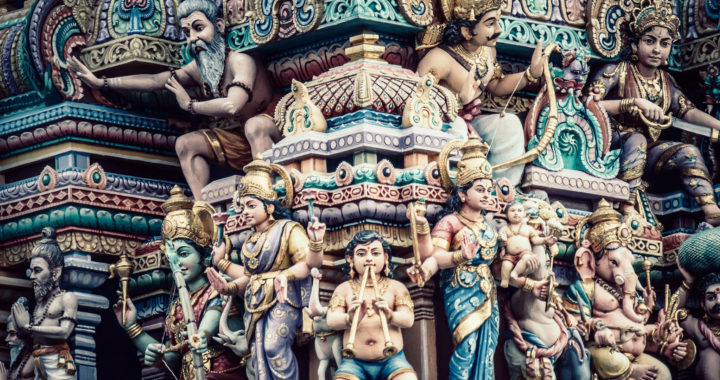Hinduism is the oldest religion in the world. Its roots and customs are believed to date back more than 4000 years ago. It now has about 900 million adherents and it is considered the third-largest religion behind Christianity and Islam. This article provides a concise overview of Hinduism, its core beliefs and teachings, as well as its practices and customs.
A Concise Overview of the Core Beliefs and Practices in Hinduism
Origin of All Things and the Nature of God
At the heart of Hinduism and the core of Hindu philosophy is the centrality of god as the absolute truth. This reality is reflected through the universe in what could be called the Supreme consciousness.
Hindu gods are worshipped in many forms. It is erroneous to consider Hinduism a polytheistic religion. The Supreme Being is often represented and worshipped in several forms or personalities. However, this being has three personifications.
Brahman is considered the Creator. Vishnu is regarded as the Preserver and Shiva is considered the Destroyer.
View of Human Nature and Concept of Good and Evil
What differentiates a human being from beasts according to Hindu philosophy is the concept called “dharma” which is regarded as a cosmic law underpinning right behavior and social order. Humans are restrained by moral rules.
Hinduism teaches the concept of good and evil through karma or the moral law of cause and effect. Deeds and actions are ultimately reciprocated. Therefore, a good deed is returned with another good deed; a bad deed is reciprocated with another bad deed.
There are three types of karma. Sanchita karma represents past karma that needs to be resolved. Prarabdha karma is future karma that is bound to be experienced and kriyamana karma is present karma that will reveal itself in the future.
Teachings About Salvation and After-Life
Hindu philosophy teaches that human beings should strive to achieve Moksha. Note that this term is also used in Buddhism, Jainism, and Sikhism,
Moksha represents emancipation, enlightenment, and liberation. Attaining it means freedom from samsara or the cycle of death and rebirth in the soteriological sense so that a person attains nirvana or reunification with the Supreme Being.
The concept of the cycle of death and rebirth or samsara also coincides with the concept of karma. Those who fail to do good deeds in their current lives would be rebirthed in their next lives and are bound to embrace the fruits of their bad deeds.
Notable Practices and Rituals in Hinduism
Hinduism teaches three paths to moksha. These are collectively called margas and include bhaktimarga or the path of devotion, jnanamarga or the path of knowledge or philosophy, and karmamarga or the path of work and action.
Furthermore, the Hindu religion is focused on the fulfillment of obligations according to the social status and stage in life of a particular person. Every Hindu is believed to pass four stages or ashramas. Each stage entails a prescribed way of living.
The four ashramas are brahmacharga which represents school age where learning is pursued; grastha or the middle years which is focused on marriage, family, and career; vanaprastha which shifts focus on spiritual things; and sannyasa or the end of life that requires devotion and meditation.
Some important rituals and practices in Hinduism include Ayurveda, yoga, namaste greeting, and Sadhu. Notable celebrations include Diwali or the Festival of Lights and festivals in honor of Hindu gods such as Ganesh, Rama Navami, and Navaratri.
It is also worth mentioning that cows are sacred among Hindus. They do not worship these animals. However, they have been regarded as sacred because of their immeasurable contribution, and honoring them promotes non-violence toward other animals.
